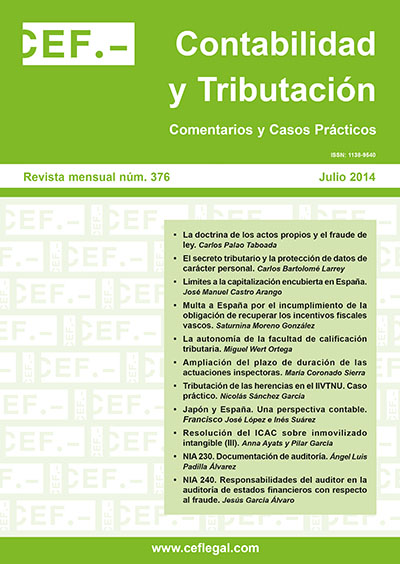Doctrina de los actos propios, comprobación de ejercicios anteriores y fraude de ley
Comentario a la STS de 4 de noviembre de 2013, rec. núm. 3262/2012
DOI:
https://doi.org/10.51302/rcyt.2014.6213Palabras clave:
doctrina de los actos propios, comprobación de ejercicios anteriores, fraude de leyResumen
La doctrina jurisprudencial que se suele enunciar con el brocardo venire contra factum proprium no valet, que impide a la parte de una relación jurídica hacer valer contra la otra una pretensión contraria a la confianza creada por su conducta anterior jurídicamente relevante, es frecuentemente alegada por los particulares frente a la Administración, incluida la tributaria. Sin embargo, esta alegación muy pocas veces es aceptada por los Tribunales; con razón, porque la doctrina de los propios actos, nacida y desarrollada en el ámbito de Derecho privado, encaja solo un tanto forzadamente en el del Derecho administrativo. La Sentencia del TS de 4 de noviembre de 2013, que confirma sin reservas la de la AN de 24 de julio de 2012, es uno de los raros casos en que el Alto Tribunal aplica la doctrina del venire contra factum en el marco de una relación jurídica tributaria. Proporciona por ello una buena oportunidad para revisar la aplicación de dicha doctrina en el ámbito administrativo en general y en el tributario en particular. En las citadas sentencias la doctrina de los propios actos aparece intrincadamente mezclada con los límites a las facultades de la Administración tributaria de revisar operaciones realizadas en ejercicios anteriores no necesariamente prescritos. Dichas sentencias formulan una doctrina de relevantes consecuencias acerca de dichos límites cuando la Administración pretende calificar tales operaciones como fraude de ley. En opinión del autor, la doctrina de los actos propios no ha sido correctamente aplicada en el caso de las sentencias analizadas. Tampoco comparte el autor la tesis de estas sentencias acerca de la posibilidad de calificar como fraudulentas (en fraude de ley) operaciones de ejercicios anteriores en los términos, a su juicio excesivamente rígidos, en que en ellas se formula.
















